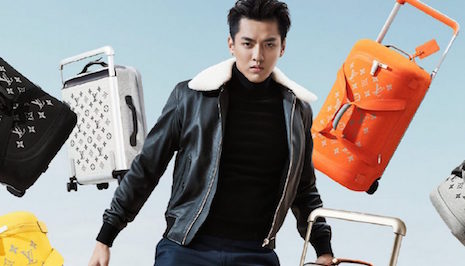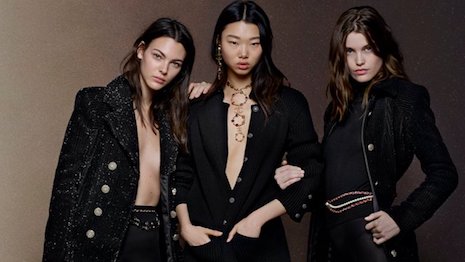 Louis Vuitton is Chinese consumers' favorite brand to gift. Image credit: Louis Vuitton
Louis Vuitton is Chinese consumers' favorite brand to gift. Image credit: Louis Vuitton
Even though electronics are the most popular gifting category for high-net-worth Chinese men, French house Louis Vuitton has beaten out Apple this year to become the most preferred label to give.
Louis Vuitton took the top spot for both men’s and women’s gifting in Hurun’s 16th annual Luxury Consumer Survey, pointing to the continued cachet and interest in heritage brands among China’s wealthy. Despite a rise in anxiety among China's wealthy, this audience is still showing a healthy appetite and spending outlook for luxury goods.
"Although a lot of luxury consumption currently takes place overseas, the brand's layout in the Chinese domestic market continues to increase, "said Hu Runbaifu, chairman/chief investigator of Hurun. "Chinese consumers are the world's most active luxury buyers, accounting for 35 percent of global luxury consumption, surpassing the Americans (22 percent) and Europeans (18 percent), according to a report from Bain."
Hurun’s Chinese Luxury Consumer Survey 2020 is based on a survey of 483 high-net-worth individuals in China. Fifty-five percent of the respondents were male, and the average age of the survey takers is 36.
Favored brands
In general, the HNW Chinese audience tends to spend about $254,000 per year. Consumers under the age of 30 spend the most on luxury goods, about $45,000 annually.
For men, consumer electronics, watches and red wine are the most popular categories to gift. Meanwhile, women are most apt to receive beauty products, jewelry and accessories.
Indicative of this split, behind Louis Vuitton, the next favored brand to give women is Bulgari, while those gifting to men are more likely to go with Apple. Other popular labels for both genders include Chanel, Dior, Hermès and Gucci.
Local Chinese brands also made the list, with liquor label Moutai and electronics brand Huawei placing in the top 10 for men.
Bulgari is the favorite jewelry brand, followed by Cartier and Van Cleef & Arpels. Meanwhile, watch labels Patek Philippe, Rolex and Vacheron Constantin held on to their top spots from last year’s list.
In fashion, women remained loyal to Chanel, Dior and Burberry, but men’s fashion favorites saw more changes as Versace rose to the top, bumping Armani out of its lead position.
 Chanel fall/winter 2018. Image credit: Chanel
For accessories, both men and women picked Hermès as their preferred brand.
Automotive marques Porsche, Mercedes and Rolls-Royce placed ahead of the pack. The average millionaire owns two cars, while billionaires tend to own three vehicles.
When looking for a luxury hotel, favored chains include The Ritz-Carlton and Peninsula Hotels. Business travel sees different leaders, as Shangri-La, Hilton and Marriott come out on top.
Ferretti is the preferred brand for yachts, while Gulfstream is the go-to for private jets.
Tourism is the number one form of entertainment for China’s HNW audience, and it makes up about a fifth of total annual household expenditures. This audience tends to travel abroad about three times per year.
Outside of China, the top destination is Japan. For those traveling domestically, Sanya is the most popular place to visit.
Affluent Chinese travelers tend to prefer to travel with Singapore Airlines.
Health and wealth
While HNW Chinese are spending on goods and travel, their main desires are closer to home. The two biggest aspirations are health and time, followed by family life.
In service to this goal of health and family, 80 percent of the HNW audience in China has some kind of personal consultant, whether it is a family doctor, a fitness coach, a nutritionist or a financial advisor. This trend is growing, up from just 67 percent last year.
Despite this emphasis on having advisors, most of this wealthy audience gets their financial information from WeChat and other digital platforms. However, almost half still turn to traditional media to get informed about financial matters.
Chinese consumers are showing less optimism, as Hurun’s Happiness Index saw the greatest decline in five years. Consumers also showed a historic low for happiness with their wealth.
The greater consumers’ net assets, the happier they said they were. Women and those who were between 31 and 45 were also less happy compared to men and older consumers.
Indicative of this anxiety, 46 percent of HNWIs are taking a risk averse strategy towards investing, up from just 35 percent last year. This focus on wealth preservation has been seen beyond China.
While the population of ultra-high-net-worth individuals grew in 2018, their combined wealth fell for the first time in three years. Wealth-X’s World Ultra Wealth Report 2019 found that the ultra affluent were focused more on wealth preservation rather than creation last year, as trade tensions and slowing equity markets made them more cautious (see story).
President Trump’s December announcement that the United States and China have reached an early agreement on a trade deal quickly cheered lobbies representing fashion and retail.
The United States Fashion Industry Association and the National Retail Federation both put out statements welcoming conclusion of the phase-one trade deal between the two countries that have been at loggerheads for almost 19 months (see story).
The Chinese HNWIs surveyed believe that the conflict with the U.S. will last for about three years.
"As the economic growth rate slows down, the proportion of high-net-worth people holding the 'risk aversion' investment philosophy increases, and happiness also faces the biggest challenge for many years," Mr. Hu said. "However, we still see that the confidence of Chinese high-net-worth individuals in their self-personality has increased significantly, as reflected in their deeper loyalty to brands and efforts to address their most anxious health problems, such as hiring personal education and nutritionists.
"At the same time, there are still 30 percent that expressed great confidence in China's economy," he said. "They believed that China's development would surpass that of the United States in 10 years, nearly double the proportion that the United States was leading, and that the proportion of immigrants would be the highest ever."
Chanel fall/winter 2018. Image credit: Chanel
For accessories, both men and women picked Hermès as their preferred brand.
Automotive marques Porsche, Mercedes and Rolls-Royce placed ahead of the pack. The average millionaire owns two cars, while billionaires tend to own three vehicles.
When looking for a luxury hotel, favored chains include The Ritz-Carlton and Peninsula Hotels. Business travel sees different leaders, as Shangri-La, Hilton and Marriott come out on top.
Ferretti is the preferred brand for yachts, while Gulfstream is the go-to for private jets.
Tourism is the number one form of entertainment for China’s HNW audience, and it makes up about a fifth of total annual household expenditures. This audience tends to travel abroad about three times per year.
Outside of China, the top destination is Japan. For those traveling domestically, Sanya is the most popular place to visit.
Affluent Chinese travelers tend to prefer to travel with Singapore Airlines.
Health and wealth
While HNW Chinese are spending on goods and travel, their main desires are closer to home. The two biggest aspirations are health and time, followed by family life.
In service to this goal of health and family, 80 percent of the HNW audience in China has some kind of personal consultant, whether it is a family doctor, a fitness coach, a nutritionist or a financial advisor. This trend is growing, up from just 67 percent last year.
Despite this emphasis on having advisors, most of this wealthy audience gets their financial information from WeChat and other digital platforms. However, almost half still turn to traditional media to get informed about financial matters.
Chinese consumers are showing less optimism, as Hurun’s Happiness Index saw the greatest decline in five years. Consumers also showed a historic low for happiness with their wealth.
The greater consumers’ net assets, the happier they said they were. Women and those who were between 31 and 45 were also less happy compared to men and older consumers.
Indicative of this anxiety, 46 percent of HNWIs are taking a risk averse strategy towards investing, up from just 35 percent last year. This focus on wealth preservation has been seen beyond China.
While the population of ultra-high-net-worth individuals grew in 2018, their combined wealth fell for the first time in three years. Wealth-X’s World Ultra Wealth Report 2019 found that the ultra affluent were focused more on wealth preservation rather than creation last year, as trade tensions and slowing equity markets made them more cautious (see story).
President Trump’s December announcement that the United States and China have reached an early agreement on a trade deal quickly cheered lobbies representing fashion and retail.
The United States Fashion Industry Association and the National Retail Federation both put out statements welcoming conclusion of the phase-one trade deal between the two countries that have been at loggerheads for almost 19 months (see story).
The Chinese HNWIs surveyed believe that the conflict with the U.S. will last for about three years.
"As the economic growth rate slows down, the proportion of high-net-worth people holding the 'risk aversion' investment philosophy increases, and happiness also faces the biggest challenge for many years," Mr. Hu said. "However, we still see that the confidence of Chinese high-net-worth individuals in their self-personality has increased significantly, as reflected in their deeper loyalty to brands and efforts to address their most anxious health problems, such as hiring personal education and nutritionists.
"At the same time, there are still 30 percent that expressed great confidence in China's economy," he said. "They believed that China's development would surpass that of the United States in 10 years, nearly double the proportion that the United States was leading, and that the proportion of immigrants would be the highest ever."
